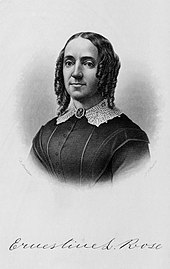Ernestine Rose
Ernestine Louise Rose (born Ernestine Louise Sigismund Potowsky in Piotrków Trybunalski on January 13, 1810 , † August 4, 1892 in Brighton ) was a Polish - American suffragette and abolitionist . She was a central figure in the early women's rights movement in the United States.
Life
Ernestine Sigismund Potowsky was born in the Piotrków Trybunalski ghetto . As the daughter of a rabbi , she received a better education than most of the girls around her. She learned Hebrew and read the Torah . At the age of 14 she began to reject the teachings of the Jewish religion because, in her opinion, they belittled women.
When her mother died in 1826, Ernestine's father arranged a marriage with a much older man who would inherit his daughter's inheritance. Ernestine, who was only 16 years old, sued the prenuptial agreement and fought for the right to keep her own property in court. She left Poland a year later.
She first moved to Berlin , where she settled for two years, despite the obstacles posed by anti-Jewish legislation. She invented and produced a type of room air freshener, the sale of which she financed her further trips. From Berlin she moved to the Netherlands , then to France and finally to England in 1831 . There she began to get involved in social policy and met Elizabeth Fry and Robert Owen , among others . With Owen, she founded the Association of All Classes of All Nations in 1835 . In 1836 she married the silversmith William Rose, with whom she moved to New York that same year .
In New York, Ernestine Rose continued to advocate the right of married women to own property. Together with Paula Wright Davis and Elizabeth Cady Stanton , she organized a campaign in favor of a corresponding bill, which was only successful years later. She also began to get involved in the free thinker movement. She wrote for the freethinker magazine Boston Investigator and gave speeches at conferences critical of religion.
In 1850 she took part in the first National Women's Rights Convention in Worcester, Massachusetts , where she introduced a resolution on political, legal and social equality between women and men. In the following years she appeared frequently as a speaker at similar conferences.
During the American Civil War , Rose advocated the abolition of slavery . After the end of the Civil War, she campaigned with Elizabeth Cady Stanton and Susan B. Anthony for both women's suffrage and the civil rights of former slaves.
In 1873 Rose returned to England with her husband. William Rose died in 1882. Ernestine Rose died ten years later in Brighton at the age of 82. She was buried in Highgate Cemetery .
literature
- Alberta Eiseman: Rebels and Reformers. Biographies of Four Jewish Americans: Uriah Phillips Levy, Ernestine L. Rose, Louis D. Brandeis, Lillian D. Wald. Zenith Books, Garden City, New York 1976, ISBN 0-3850-1588-7 .
- Victor Grossman : Rebel Girls. 34 American women in portraits , Papyrossa, Cologne 2012, ISBN 978-3-8943-8501-9 , pp. 94-100
- Alice Felt Tyler: Rose, Ernestine Louise Siismondi Potowski. In: Edward T. James, Janet Wilson James, Paul S. Boyer, (Eds.): Notable American Women, 1607-1950. A Biographical Dictionary. Harvard University Press, Cambridge, Massachusetts 1971, ISBN 0-6746-2731-8 , pp. 195-196.
- Carol A. Kolmerten: The American Life of Ernestine L. Rose. Syracuse University Press, 1999, ISBN 0-8156-0528-5 .
- Yuri Suhl: Eloquent Crusader: Ernestine Rose. J. Messner, New York 1970, ISBN 0-6713-2211-7 .
- Yuri Suhl: Ernestine L. Rose and the Battle for Human Rights. Reynal, New York 1959.
- Yuri Suhl: Ernestine L. Rose. Women's Rights Pioneer. Biblio Press, New York 1990, ISBN 0-9303-9508-5 .
Web links
- Biography on the pages of the Ernestine Rose Society , Brandeis University
- Ernestine Rose in the Jewish Women's Archive (English)
| personal data | |
|---|---|
| SURNAME | Rose, Ernestine |
| ALTERNATIVE NAMES | Rose, Ernestine Louise (full name); Sigismund Potowsky, Ernestine Louise (birth name); Susmond Potowsky, Ernestine Louise; Siismondi Potowsky, Ernestine Louise |
| BRIEF DESCRIPTION | Polish-American suffragette and abolitionist |
| DATE OF BIRTH | January 13, 1810 |
| PLACE OF BIRTH | Piotrków Trybunalski |
| DATE OF DEATH | 4th August 1892 |
| Place of death | Brighton |

